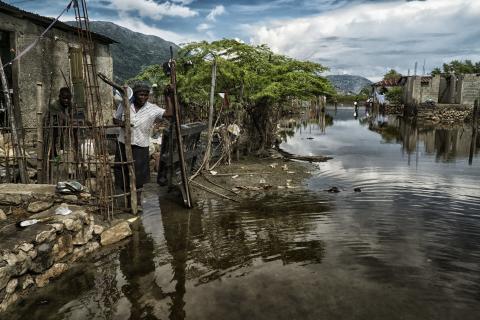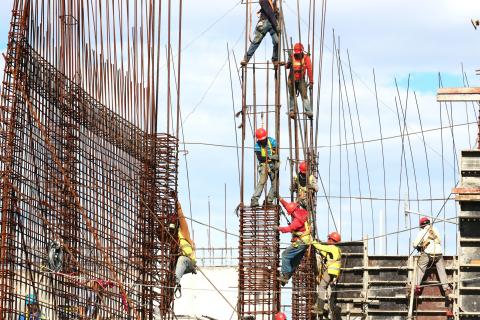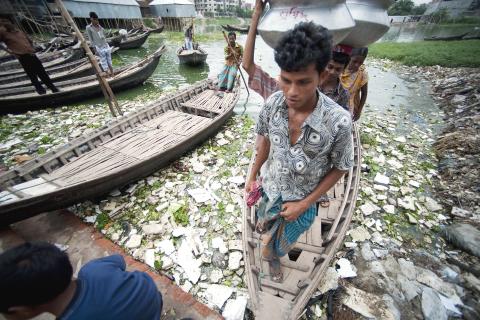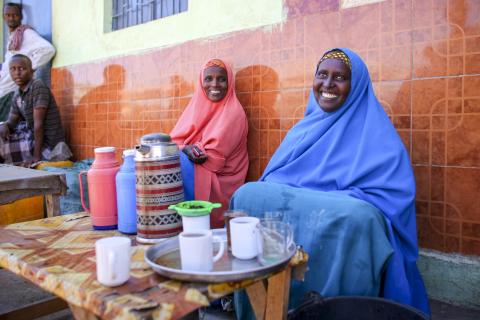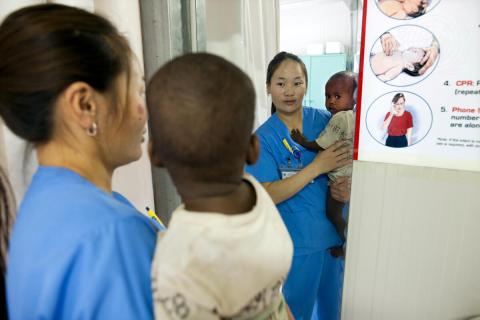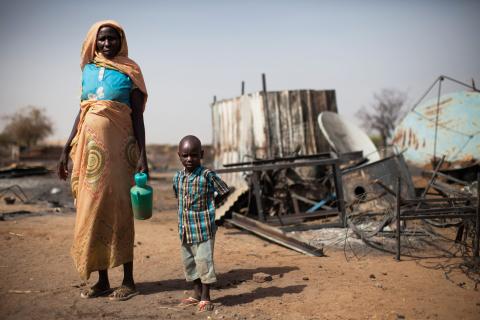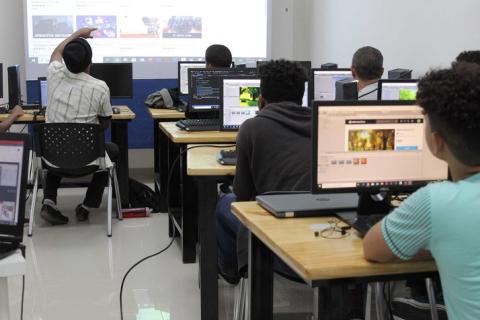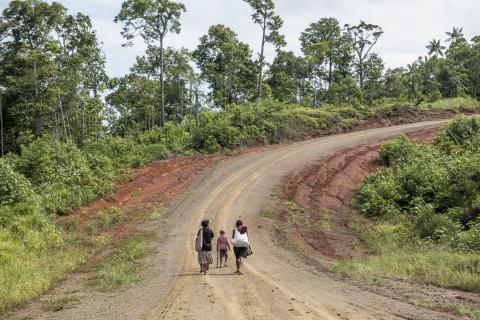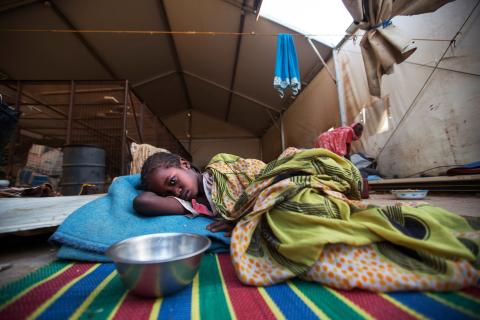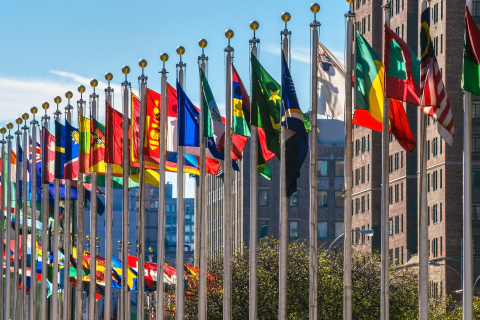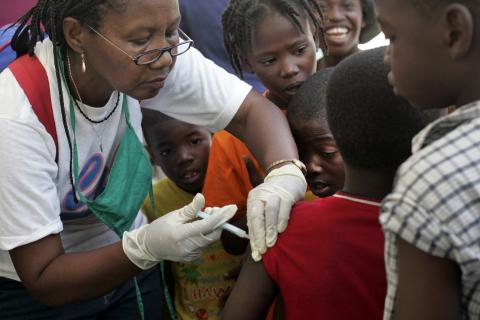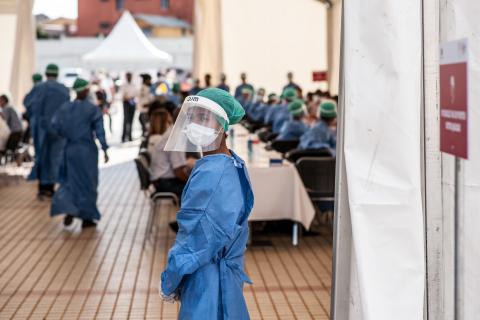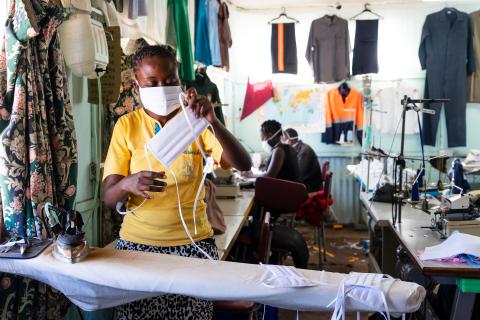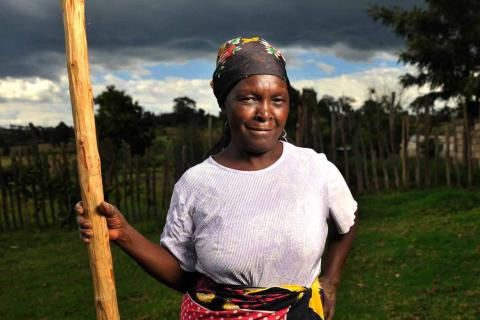
Policy Briefs
UN DESA experts are working to help decision makers around the world navigate tough choices and to find ways to recover better from the COVID-19 crisis and prepare for complex and compounded risks in today's interconnected world.
Watch this space for the latest research, analysis and policy advice from UN DESA, an effort to support and complement the United Nations Secretary-General’s initiatives in response to the COVID-19 crisis, Decade of Action to deliver the Sustainable Development Goals and call by the Member States to advance Our Common Agenda.
UN/DESA Policy Brief #99: Why does corporate sustainability reporting matter to rebuilding better?
Business and financials models must be rethought to accelerate and strengthen business’ contributions to sustainable development
UN/DESA Policy Brief #98: Risk-informed finance
All financing must be risk-informed and resilient, and sufficient financing must be available for investments in risk reduction and resilience, at national and global levels.
UN/DESA Policy Brief #97: COVID-19 and Beyond: Scaling up Private Investment for Sustainable Development
Further action is needed to better channel investment to countries and SDG-related sectors that are most in need. The development of innovative and scalable global platforms, instruments and funds would be an important first step in this regard.
UN/DESA Policy Brief #96: COVID-19: How the data and statistical community stepped up to the new challenges
New partnerships have been crucial in responding to new data demands, helping National Statistical Offices introduce measures that are permanently changing the statistical production process in many countries.
UN/DESA Policy Brief #95: What triggers economic insecurity and who is most at risk?
A full recovery from the pandemic crisis is not possible without addressing economic security and reducing inequality.
This policy brief highlights inequality in the experience of economic security focusing on the risks to livelihoods and the protections against those risks as laid out by the Universal Declaration of Human Rights.
UN/DESA Policy Brief #94: A changing world of work: implications for the social contract
COVID-19 has had a devastating impact on the world
of work, hitting labour markets that were already weak
and fragile.
UN/DESA Policy Brief #93: Social policy and social protection measures to build Africa better post-COVID-19
This policy brief reviews the socio-economic impacts of the COVID-19 crisis in Africa and presents the continent’s social protection responses.
UN/DESA Policy Brief #92: Leveraging digital technologies for social inclusion
COVID-19 is accelerating the pace of digital transformation. In so doing, it is opening the opportunities for advancing social progress and fostering social inclusion, while simultaneously exacerbating the risk of increased inequalities and exclusion of those who are not digitally connected.
UN/DESA Policy Brief #91: The politics of economic insecurity in the COVID-19 era
The COVID-19 crisis has served as a reminder of the extent of economic insecurity, even in countries and among groups that previously considered themselves secure. This is likely to have profound consequences, threatening countries’ ability to achieve the 2030 Agenda for Sustainable Development and its SDGs.
UN/DESA Policy Brief #90: A new global deal must promote economic security
Fears related to economic insecurity are on the rise. Changes in the world of work, together with globalization and technological breakthroughs, have benefited many people but are also putting many others at disadvantage or at risk. These long-standing trends, which have raised aspirations but also fears, are compounded by evolving threats, including those brought about by climate change and the COVID-19 pandemic.
UN/DESA Policy Brief #89: Strengthening Data Governance for Effective Use of Open Data and Big Data Analytics for Combating COVID-19
Governments are using big data analytics to get prepared, react effectively, and develop both short term and long-term strategies. Yet, increasing public concerns about data privacy and security put in jeopardy public trust in data collection, use and dissemination by government, business and relevant non-government institutions.
UN/DESA Policy Brief #88: Financing sustainable forest management: a key component of sustainable COVID-19 recovery
This policy brief aims to provide an analysis of the adverse impacts of the pandemic on the income generation function of forests, and the current and future funding trends for forests.
UN/DESA Policy Brief #87: Integrated national financing frameworks—a framework to build back better
Financing has emerged as a key challenge in SDG implementation. Yet, a recent study found that 79 out of 107 national sustainable development plans are not costed. Integrated national financing frameworks (INFFs) can help countries to close this gap.
UN/DESA Policy Brief #86: The long-term impact of COVID-19 on poverty
As developing countries currently face the prospect
of costly debt crises with far-reaching consequences,
global action is urgently needed. The window to mitigate
the disastrous long-term consequences of COVID-19 on
poverty is closing rapidly.
UN/DESA Policy Brief #85: Impact of COVID-19: perspective from Voluntary National Reviews
Multilateralism and global solidarity are essential to build back better by responding to COVID-19 in a way that supports the implementation of the 2030 Agenda and SDGs, bolsters results and addresses gaps in sustainable development.
UN/DESA Policy Brief #84: Achieving SDGs in the wake of COVID-19: Scenarios for policymakers
Establishment of robust universal healthcare and social protection systems should be taken as immediate goals, and efforts should be made to build upon the emergency measures taken during the COVID-19 crisis so as to reach these goals.
UN/DESA Policy Brief #81: Impact of COVID-19 on SDG progress: a statistical perspective
COVID-19 is having a devastating impact on all 17 Goals and threatening the achievements already made in
many areas. While the virus has impacted everyone, it is the poorest and most vulnerable who are affected
disproportionally by the pandemic.
UN/DESA Policy Brief #83: Recovering from COVID-19: the importance of investing in global public goods for health
Amidst deliberations on priority areas for rebuilding, much attention has been paid to the need to strengthen domestic health care, and such proposals will certainly be high on the agenda for many Governments. The crisis, however, has also shone a spotlight on the shortcomings of the global health system.
UN/DESA Policy Brief #82: COVID-19 and a primer on shock-responsive social protection systems
Risks of implementing more shockresponsive social protection include overwhelming demand, lack of coordination, poor targeting and negative public perception. These can be partially offset by ensuring universal access to programmes. A country’s available fiscal space and level of debt distress are key contextual factors that determine the feasibility of more shock-responsive social protection.
UN/DESA Policy Brief #80: Forests at the heart of a green recovery from the COVID-19 pandemic
This brief highlights how forests and the forestry sector provide essential services and products to support health and livelihoods during times of crisis, how investing in sustainable forest management and forestry jobs offer opportunities for a green recovery, and how healthy forests build resilience against future pandemics. In this context, it proposes policy recommendations to ensure that forest-based solutions be considered for recovery from the COVID-19 pandemic and building back better.
 Welcome to the United Nations
Welcome to the United Nations

